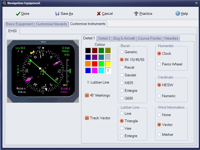RANT XL - Getting Started
To view any of these images full-screen just click on them.

To start using RANT XL and learning the black art of radio aids navigation couldn’t be simpler. Go straight to the tutorial section and work your way through in the language of your choice. You can accept the photo-realistic instruments we have selected as the default or you can go the NAV FITS section. There you can select from a number of proprietary instrument configurations ranging from a simple DI/OBS up to modern EFIS presentations with RNAV and GPS. Your selection can be modified further by altering the presentation and functionality of the instruments. RANT XL is the only program we know of that can accurately simulate ADF dip - an error that must be mastered before taking the Instrument Rating Test. Save this to a new file and then the exercises and practice will be based upon your choice! More than 60 tutorials cover the complete spectrum of radio navigation techniques.

Initial tutorials describe the instruments and their functions, then progress to basic radnav techniques
leading up to NDB/VOR joins, holds and ILS procedures. In association with Jeppesen Sanderson inc we have a section on interpreting en-route and approach charts
and there are also tutorials on compass turns, mental dead-reckoning and Morse. Once a radio aids navigation
tutorial is completed that technique can then be practised in the appropriate
EXERCISE section. The computer will pick a task, for example fly inbound
on a certain track to a beacon, which you will then attempt. You may monitor
your progress on the screen or have your position hidden until the end of
the exercise as you wish. Because the task is chosen at random there are
an unlimited number of exercises that can be flown. RANT XL is an excellent
training tool both for private pilots and those in a more formal training
environment. During any exercise, or flying in the practice mode, a recording
may be made of your progress (or otherwise!) and saved for later playback.
This is particularly useful for instructors who can set work for students
or demonstrate the classic NDB entry and hold. Exercises exist for all procedures,
probably the most useful being the approach and departure from selected aerodromes.
Here you are able to fly the aircraft using an
 on-screen Jeppesen plate and toggle between the plate and the map screen
to monitor your progress. Wind can be selected or chosen at random with the
option of real or forecast wind (varying slightly as it does in the real
world). Over eighty exercises are included covering all of the popular UK
Instrument Rating Test destinations plus some European, New Zealand and US airfields,
but additional libraries of approach/departure plates and navexes can be created
by the user using the PROCEDURES BUILDER.
on-screen Jeppesen plate and toggle between the plate and the map screen
to monitor your progress. Wind can be selected or chosen at random with the
option of real or forecast wind (varying slightly as it does in the real
world). Over eighty exercises are included covering all of the popular UK
Instrument Rating Test destinations plus some European, New Zealand and US airfields,
but additional libraries of approach/departure plates and navexes can be created
by the user using the PROCEDURES BUILDER.
